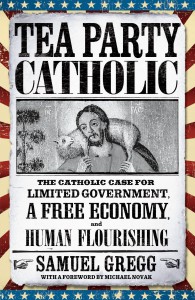 Bruce Edward Walker, recently wrote a column for the Morning Sun that relates the recent Supreme Court decision on Hobby Lobby with America’s Founding and Samuel Gregg’s latest, Tea Party Catholic. The piece begins by discussing the Declaration of Independence and one of its signers, Charles Carroll, “a successful Maryland businessmen,” Walker says, “who was also Roman Catholic and thus denied voting rights and the freedom to hold government office under British colonial rule. In other words, Carroll had a bigger dog in the fight for independence than any of his fellow American Protestant revolutionaries.”
Bruce Edward Walker, recently wrote a column for the Morning Sun that relates the recent Supreme Court decision on Hobby Lobby with America’s Founding and Samuel Gregg’s latest, Tea Party Catholic. The piece begins by discussing the Declaration of Independence and one of its signers, Charles Carroll, “a successful Maryland businessmen,” Walker says, “who was also Roman Catholic and thus denied voting rights and the freedom to hold government office under British colonial rule. In other words, Carroll had a bigger dog in the fight for independence than any of his fellow American Protestant revolutionaries.”
Walker continues:
For Gregg, Carroll represents a fitting template for contemporary Christians of a particular denomination who advocate for lower taxes and less government intervention in the exercise of their respective faiths or other aspects of their lives. Such pushback against the state was the impetus for our War of Independence, and is the spark that ignited the Tea Party movement – the latter whose members fight for similar freedoms without ridiculous assertions of resorting to guns, jihads, crusades or even remote considerations thereof.
“To obtain religious, as well as civil liberty, I entered zealously into the Revolution,” wrote Carroll in 1827. “God grant that this religious liberty may be preserved in these States to the end of time.” When England imposed the Stamp Act in 1765, Carroll wrote, “The Americans are jealous of their privileges and resolved to maintain them.” He added his fellow colonialists “are not yet corrupt enough to undervalue Liberty, they are truly sensible of its blessings, and not only talk of them as they do somewhere else, but really wish their continuance.”
Gregg astutely notes that the First Amendment doesn’t protect U.S. citizens from religion, nor does it identify tolerance as a desired result of foolishly denying our country’s religious heritage. “It is perfectly possible for a nation to affirm historical truths about a religion’s influence upon a nation while also insisting that a robust conception of religious freedom is a right enjoyed by every member of society, regardless of their faith or non-belief,” wrote Gregg. He continued: “[I]t is not the business of governments or officials acting in their name to formally or informally promote a brand of secularism as an unofficial state faith that seeks to restrict the exercise of religious liberty to religious worship.” This, states Gregg, is a principled rather than merely pragmatic argument.
Fortunately (thus far, albeit by a narrow 5-4 margin), the U.S. Supreme Court made Carroll’s memory proud this week in Burwell v. Hobby Lobby Stores, Inc. The decision favoring Hobby Lobby, dear readers, renders the separation of church and state as properly understood in the First Amendment by allowing the family-owned retailer to honor the tenets of its faith as opposed to slavishly following the state’s tyrannical secular diktat. Let freedom ring!

